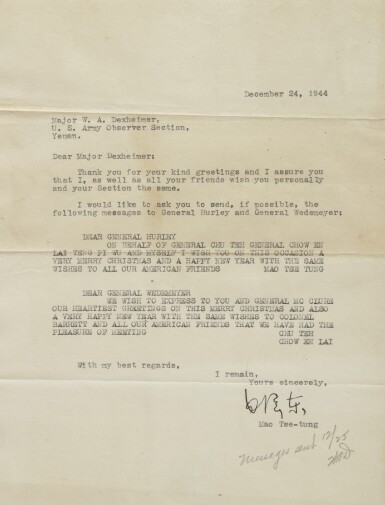Fine Books and Manuscripts, Including the Olympic Manifesto
Fine Books and Manuscripts, Including the Olympic Manifesto

Property from the Descendants of Colonel Wilbur A. Dexheimer
MAO ZEDONG | Typed letter signed ("Mao Tse-tung") as leader of the Chinese Communist Party, requesting that Major Dexheimer send Christmas greetings on his behalf to General Hurley and on behalf of Zhou Enlai to General Wedemeyer
Auction Closed
December 18, 08:58 PM GMT
Estimate
10,000 - 15,000 USD
Lot Details
Description
Property from the Descendants of Colonel Wilbur A. Dexheimer
MAO ZEDONG
Typed letter signed ("Mao Tse-tung") as leader of the Chinese Communist Party, requesting that Major Dexheimer send Christmas greetings on his behalf to General Hurley and on behalf of Zhou Enlai to General Wedemeyer
One page (10 1/4 x 8 in.; 262 x 223 mm), with type addressed envelope, 24 December 1944; some light discoloration, folds.
General Patrick Hurley and General Albert Wedemeyer were not part of the U.S. Army Observers Section in Yenan, but rather diplomats sent by President Franklin Roosevelt. Neither man favored the Chinese Communist party, but Mao and other chinese official politely wish: “a very Merry Christmas and a Happy New Year with the same wishes to all our American friends.”
Zhu De and Zhou EnLai wishes are addressed to the successor of General Joseph Stilwell, General Wedemeyer. Stilwell had originally commanded the American troops in China, but was continually at odds with Chiang Kai-shek. He viewed the nationalist regime as “more concerned with maintaining its political supremacy than driving the Japanese out of China” and supported the Chinese Communists. Removed from his post only two months before this letter was written, his replacement Wedemeyer was a tacit supporter of Chiang.
On 9 January 1945, Mao used his proximity to the Dixie Mission to send a much more important diplomatic request to General Wedemeyer. Transmitted by Mission Major Ray Cromley, Mao Zedong and Zhou Enlai offered to come to Washington, D.C. to talk in person with President Roosevelt. A message that was never delivered by Wedemeyer.
General Patrick Hurley’s written directive from the president was: “you are hereby designated as my personal representative with the Generalissimo Chiang Kai-shek, reporting directly to me. Your principal mission is to promote efficient and harmonious relations between the Generalissimo and General [Joseph] Stilwell to facilitate General Stilwell's exercise of command over the Chinese armies placed under his direction.” Hurley did not quite grasp how wide the divide was between the Nationalist and Communist parties, and attempted to negotiate a peace between the two. During his first visit to Yan’an, he met with Mao several times. The talks culminated in Hurley and Mao both signing an agreed upon declaration for wartime peace with the Kuomintang. However, when Hurley showed the declaration to Chiang who immediately disagreed to the terms. The peace deals fell apart from there, and Hurley ultimately resigned from his position in frustration, and blamed the Dixie Mission for his failure.
